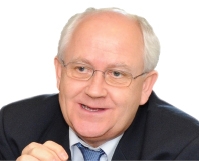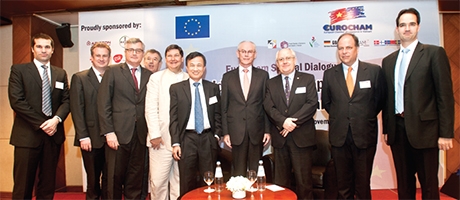Business community finds its voice
 VIR’s Nguyen Hanh talks with Preben Hjortlund, chairman of the European Chamber of Commerce in Vietnam (EuroCham), a key organiser of the summit, about the chamber’s expectations of this event and its recommendations for better trade and investment between the ASEAN and EU.
VIR’s Nguyen Hanh talks with Preben Hjortlund, chairman of the European Chamber of Commerce in Vietnam (EuroCham), a key organiser of the summit, about the chamber’s expectations of this event and its recommendations for better trade and investment between the ASEAN and EU.
Representing the European business community in Vietnam and being a co-organiser of the upcoming ASEAN-EU Business Summit, what does EuroCham expect from this event?
EuroCham is the pre-eminent European Chamber of Commerce. We have almost 800 members from nearly all European nations; we are affiliated with most of the European national business associations in Vietnam. We are connected with the European Chambers across ASEAN through the EU- ASEAN Business Council, and to Vietnamese businesses through the Vietnam EU Business Forum, which is in cooperation with the Vietnam Chamber of Commerce and Industry (VCCI). So we clearly have the best networks to ensure the success, together with our partners, of this summit.
We are expecting this summit to improve communication and promote the transfer of best practices between the various businesses present. We also expect a coherent set of papers to be developed to assist ASEAN in improving the business climate in the region for all businesses, whether European, Vietnamese or ASEAN.

ASEAN is considered one of the most attractive regions for trade and investment activities due to its dynamism, high economic growth, strong consumption and the ongoing progress of the regional agenda. How important is ASEAN in the corporate strategy of EU companies in your view, especially in the context that the uncertainties in the global, EU and US economies continue to unfold?
You are absolutely correct in your comments. ASEAN represents a very young, dynamic, high growth market, offering a lot of potential and space for all companies. And European companies are of course looking for opportunities and growth, especially when such growth is harder to achieve in markets, such as Europe, which are more developed and have an older demographic profile. The likely gradual development of an ASEAN economic block and free trade zone makes the region even more attractive: a number of smaller countries will become a much larger block allowing much greater economy of scale for companies trading with or established in ASEAN.
What are EuroCham’s recommendations to the ASEAN governments for better trade and investment between the ASEAN and EU?
The specific recommendations will of course come out of the summit itself, where we have gathered a large number of businesses who are cooperating to make detailed recommendations appropriate for their sectors. However it is fair to make a few very general comments. Most businesses look for clarity of rules and laws; transparency and fairness in their application—in summary a “level playing field” where all companies, whether local, ASEAN or European, are treated equally.
Some ASEAN members, including Vietnam, are engaged in talks for a Free Trade Agreement (FTA) with the EU and EuroCham is an advocate for such deals. How is EuroCham supporting the negotiations?
We strongly support the FTA between the EU and Vietnam. We have been assisting in various ways in the process as far as we can; by publicising the FTA to our members and, together with the VCCI, to the Vietnamese business community; by encouraging our members to give input to the FTA discussions. We ourselves compile a compendium of business issues which need to be addressed in our Annual Whitebook, which is useful for the negotiators on both sides to understand those issues which undermine investment.
ASEAN aims to create an ASEAN economic community by 2015. What is EU companies’ point of view on that vision and what are the prospects for trade and investment by EU companies in the region when such an economic community is established?
An effective ASEAN economic community and trade zone is of course of great interest to EU based companies. Any moves towards reducing barriers between ASEAN countries are likely to facilitate trade and make ASEAN a far more relevant entity from the business perspective. Any moves towards making common standards and treatment of business is welcome as it removes complexity and reduces costs for companies and consumers alike. So European companies of course support the ASEAN initiative, and are eagerly participating in activities, such as this summit, which will assist in turning the dream of an ASEAN economic community into a fully functioning reality.
With common strengths like robust GDP growth, huge markets and low labour cost, ASEAN members such as Thailand, Indonesia, Malaysia, Myanmar and Vietnam are fiercely competing to attract foreign direct investment. In what sectors is Vietnam showing its competitiveness in attracting European investment, against the rest of the pack?
In recent years Vietnam has been attracting investment because of its low cost base. This has made it competitive in shoes, apparel, textiles. Vietnam is also clearly very fertile, and the agricultural sector has been very competitive. The challenge for Vietnam now is to move up the value chain. Others are already competing on the basis of low costs. Myanmar is of course the new player in the region, and will seek to attract investment using a low cost model. So Vietnam cannot stand still and rely on what has worked in the past.
EuroCham Vietnam’s quarterly business climate index last year showed a continual decline in the business sentiment of its members. Do you think there will be improvement in the index this year when the local macroeconomic situation is getting better?
Business sentiment in Vietnam has been badly affected in recent years by the problems in the market. The vast majority of our members are, however, here for the long term. Serious companies expect there to be bumps in the road in developing markets, so are still committed and, in some cases, investing more despite the challenging market.
Please give us a briefing on EuroCham’s recommendations to the Vietnamese government for a better business environment.
We are pleased that the government appreciates the seriousness of the situation and is taking action to resolve problems in the market, especially in the banking sector where the effects of these problems are most concentrated. However, the banking problems in Vietnam are symptoms of structural problems in the market.
On too many occasions over the past years has capital been allocated to projects which are uneconomic, or where projects are unjustified, the capital has been inefficiently used. In the end this means that Vietnam cannot compete internationally as capital has been wasted and costs have risen as a result. We continue to support the government’s intentions to insist on more efficiency in capital allocation, especially in the SOE sector, where many of these problems have been most evident.
What the stars mean:
★ Poor ★ ★ Promising ★★★ Good ★★★★ Very good ★★★★★ Exceptional
 Tag:
Tag:
Related Contents
Latest News
More News
- Russian President congratulates Vietnamese Party leader during phone talks (January 25, 2026 | 09:58)
- Worldwide congratulations underscore confidence in Vietnam’s 14th Party Congress (January 23, 2026 | 09:02)
- Political parties, organisations, int’l friends send congratulations to 14th National Party Congress (January 22, 2026 | 09:33)
- 14th National Party Congress: Japanese media highlight Vietnam’s growth targets (January 21, 2026 | 09:46)
- 14th National Party Congress: Driving force for Vietnam to continue renewal, innovation, breakthroughs (January 21, 2026 | 09:42)
- Vietnam remains spiritual support for progressive forces: Colombian party leader (January 21, 2026 | 08:00)
- Int'l media provides large coverage of 14th National Party Congress's first working day (January 20, 2026 | 09:09)
- Vietnamese firms win top honours at ASEAN Digital Awards (January 16, 2026 | 16:45)
- ASEAN Digital Ministers' Meeting opens in Hanoi (January 15, 2026 | 15:33)
- ASEAN economies move up the global chip value chain (December 09, 2025 | 13:32)

















 Mobile Version
Mobile Version